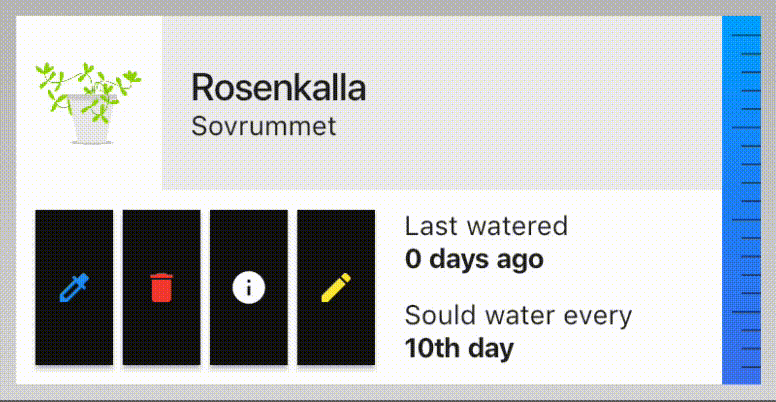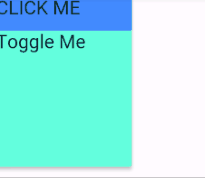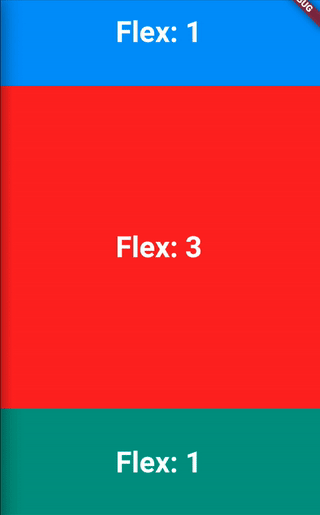how to animate collapse elements in flutter
Solution 1:
If you want to collapse a widget to zero height or zero width that has a child that overflow when collapsed, I would recommend SizeTransition or ScaleTransition.
Here is an example of the ScaleTransition widget being used to collapse the container for the four black buttons and status text. My ExpandedSection widget is used with a column to get the following structure.

An example of a Widget that use animation with the SizeTransition widget:
class ExpandedSection extends StatefulWidget {
final Widget child;
final bool expand;
ExpandedSection({this.expand = false, this.child});
@override
_ExpandedSectionState createState() => _ExpandedSectionState();
}
class _ExpandedSectionState extends State<ExpandedSection> with SingleTickerProviderStateMixin {
AnimationController expandController;
Animation<double> animation;
@override
void initState() {
super.initState();
prepareAnimations();
_runExpandCheck();
}
///Setting up the animation
void prepareAnimations() {
expandController = AnimationController(
vsync: this,
duration: Duration(milliseconds: 500)
);
animation = CurvedAnimation(
parent: expandController,
curve: Curves.fastOutSlowIn,
);
}
void _runExpandCheck() {
if(widget.expand) {
expandController.forward();
}
else {
expandController.reverse();
}
}
@override
void didUpdateWidget(ExpandedSection oldWidget) {
super.didUpdateWidget(oldWidget);
_runExpandCheck();
}
@override
void dispose() {
expandController.dispose();
super.dispose();
}
@override
Widget build(BuildContext context) {
return SizeTransition(
axisAlignment: 1.0,
sizeFactor: animation,
child: widget.child
);
}
}
AnimatedContainer also works but Flutter can complain about overflow if the child is not resizable to zero width or zero height.
Solution 2:
Alternatively you can just use an AnimatedContainer to mimic this behavior.

class AnimateContentExample extends StatefulWidget {
@override
_AnimateContentExampleState createState() => new _AnimateContentExampleState();
}
class _AnimateContentExampleState extends State<AnimateContentExample> {
double _animatedHeight = 100.0;
@override
Widget build(BuildContext context) {
return new Scaffold(
appBar: new AppBar(title: new Text("Animate Content"),),
body: new Column(
children: <Widget>[
new Card(
child: new Column(
mainAxisAlignment: MainAxisAlignment.center,
crossAxisAlignment: CrossAxisAlignment.center,
children: <Widget>[
new GestureDetector(
onTap: ()=>setState((){
_animatedHeight!=0.0?_animatedHeight=0.0:_animatedHeight=100.0;}),
child: new Container(
child: new Text("CLICK ME"),
color: Colors.blueAccent,
height: 25.0,
width: 100.0,
),),
new AnimatedContainer(duration: const Duration(milliseconds: 120),
child: new Text("Toggle Me"),
height: _animatedHeight,
color: Colors.tealAccent,
width: 100.0,
)
],
) ,
)
],
),
);
}
}
Solution 3:
I think you are looking for ExpansionTile widget. This takes a title property which is equivalent to header and children property to which you can pass widgets to be shown or hidden on toggle.
You can find an example of how to use it here.
Simple Example Usage:
new ExpansionTile(title: new Text("Numbers"),
children: <Widget>[
new Text("Number: 1"),
new Text("Number: 2"),
new Text("Number: 3"),
new Text("Number: 4"),
new Text("Number: 5")
],
),
Hope that helps!
Solution 4:
Output:

Code:
class FooPageState extends State<SoPage> {
static const _duration = Duration(seconds: 1);
int _flex1 = 1, _flex2 = 2, _flex3 = 1;
@override
Widget build(BuildContext context) {
final total = _flex1 + _flex2 + _flex3;
final height = MediaQuery.of(context).size.height;
final height1 = (height * _flex1) / total;
final height2 = (height * _flex2) / total;
final height3 = (height * _flex3) / total;
return Scaffold(
body: Column(
children: [
AnimatedContainer(
height: height1,
duration: _duration,
color: Colors.red,
),
AnimatedContainer(
height: height2,
duration: _duration,
color: Colors.green,
),
AnimatedContainer(
height: height3,
duration: _duration,
color: Colors.blue,
),
],
),
);
}
}
Solution 5:
Thanks to @Adam Jonsson, his answer resolved my problem. And this is the demo about how to use ExpandedSection, hope to help you.
class ExpandedSection extends StatefulWidget {
final Widget child;
final bool expand;
ExpandedSection({this.expand = false, this.child});
@override
_ExpandedSectionState createState() => _ExpandedSectionState();
}
class _ExpandedSectionState extends State<ExpandedSection>
with SingleTickerProviderStateMixin {
AnimationController expandController;
Animation<double> animation;
@override
void initState() {
super.initState();
prepareAnimations();
_runExpandCheck();
}
///Setting up the animation
void prepareAnimations() {
expandController =
AnimationController(vsync: this, duration: Duration(milliseconds: 500));
animation = CurvedAnimation(
parent: expandController,
curve: Curves.fastOutSlowIn,
);
}
void _runExpandCheck() {
if (widget.expand) {
expandController.forward();
} else {
expandController.reverse();
}
}
@override
void didUpdateWidget(ExpandedSection oldWidget) {
super.didUpdateWidget(oldWidget);
_runExpandCheck();
}
@override
void dispose() {
expandController.dispose();
super.dispose();
}
@override
Widget build(BuildContext context) {
return SizeTransition(
axisAlignment: 1.0, sizeFactor: animation, child: widget.child);
}
}
class MyApp extends StatelessWidget {
// This widget is the root of your application.
@override
Widget build(BuildContext context) {
return MaterialApp(
title: 'Flutter Demo',
home: Scaffold(
appBar: AppBar(
title: Text('Demo'),
),
body: Home(),
),
);
}
}
class Home extends StatefulWidget {
@override
_HomeState createState() => _HomeState();
}
class _HomeState extends State<Home> {
bool _expand = false;
@override
Widget build(BuildContext context) {
return Column(
children: [
Header(
onTap: () {
setState(() {
_expand = !_expand;
});
},
),
ExpandedSection(child: Content(), expand: _expand,)
],
);
}
}
class Header extends StatelessWidget {
final VoidCallback onTap;
Header({@required this.onTap});
@override
Widget build(BuildContext context) {
return GestureDetector(
onTap: onTap,
child: Container(
color: Colors.cyan,
height: 100,
width: double.infinity,
child: Center(
child: Text(
'Header -- Tap me to expand!',
style: TextStyle(color: Colors.white, fontSize: 20),
),
),
),
);
}
}
class Content extends StatelessWidget {
@override
Widget build(BuildContext context) {
return Container(
color: Colors.lightGreen,
height: 400,
);
}
}